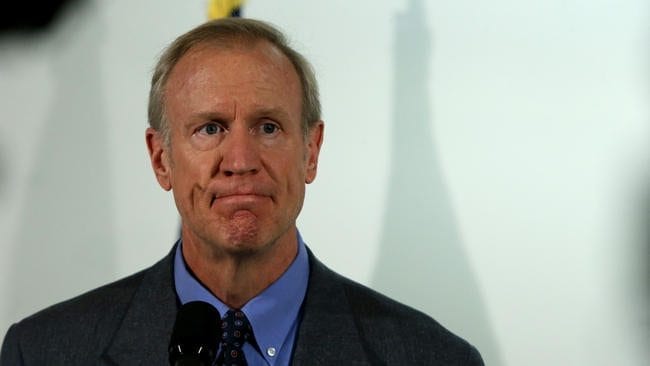
Illinois — Republican Gov. Bruce Rauner on Friday used his veto powers to rewrite a bill aimed at decriminalizing possession of small amounts of marijuana, saying the measure that lawmakers sent him would let people carry too much pot and sets fines too low.
Rauner said while he supports the “fundamental purposes” of keeping people out of jail and cutting court costs, such a significant change in drug laws “must be made carefully and incrementally.” Sponsors of the bill pushed back, saying the changes are “low-hanging fruit” when it comes to reforming the criminal justice system and contending the governor is working against his own goal of reducing the number of prison inmates.
Under the proposal, people caught with up to 15 grams of marijuana — about the equivalent of 25 cigarette-sized joints — would not go to court but instead receive fines ranging from $55 to $125. Rauner said those standards were too lax and the threshold should be lowered to 10 grams and fines should range from $100 to $200.
The governor also took issue with a provision that would loosen the state’s zero-tolerance policy for driving under the influence of cannabis. Currently, a driver can be charged if any trace of marijuana is detected, even if it was ingested days or weeks before and a driver showed no signs of impairment.
The bill that lawmakers sent Rauner would have set new limits of 15 nanograms of THC per milliliter of blood. Rauner again argued that standard went too far in the opposite direction, suggesting the limit instead should be 5 nanograms per milliliter of blood.
Sponsoring Rep. Kelly Cassidy, D-Chicago, acknowledged science on that front was evolving and said she knew when the bill passed that lawmakers likely would have to revisit what levels of THC — the psychoactive component of marijuana — were acceptable when someone was behind the wheel.
Kelly called Rauner’s partial veto “frustrating,” saying she made numerous changes during the negotiation process at the behest of Republican leaders who act as the governor’s liaisons.
“This goal of reducing the prison population is one that we share, but it’s not going to be easy and it’s not going to be accomplished with half measures,” Cassidy said. “It really comes down to with every change you make, someone gets arrested who wouldn’t otherwise. And if we want to keep people out of our jail system we have to take bold moves, and does putting someone in jail for 10 grams instead of 15 grams make us safer? I would argue it doesn’t.”
Sen. Jason Barickman, a Bloomington Republican who voted for the bill, said Rauner simply was using his “unique power to help correct imperfect legislative negotiations.”
“This is a significant change in public policy. We want to get it right,” Barickman said. “The governor is expressing his opinion on that, which helps us move the ball forward.”
The bill now returns to lawmakers, who can vote to go along with Rauner’s changes or reject them. If lawmakers opt not to take up the changes, the bill dies. Cassidy said she would have to regroup with supporters to decide the next move.
In the meantime, current law stands. That means someone caught with small amounts of marijuana faces fines of up to $2,500 and up to a year in a jail.
Legislators signed off on the proposal in May after Cook County State’s Attorney Anita Alvarez, who is expected to face a tough re-election fight next year, announced her office would stop prosecuting low-level marijuana possession cases for people with fewer than three arrests or citations. The state legislation also follows a measure enacted by Chicago in 2012 that allowed police to issue tickets of $250 to $500 for someone caught with 15 grams or less of marijuana.
Also Friday, Rauner used his amendatory veto powers to make changes in a law that would have extended the state’s medical marijuana trial program, which is set to expire in January 2018.
Lawmakers wanted to push that date back by four years from the time the state’s first dispensary opens later this year. Advocates said the extension is needed after delays under then-Democratic Gov. Pat Quinn resulted in patients spending the majority of the initial four-year trial period without access to medical marijuana.
But Rauner said the program should only be extended by four months because that “would account for the delay in the final months of the prior administration.”
“Given that no sale has yet occurred and we have not had an opportunity to evaluate the success and failure of the pilot program, a further extension would be premature,” Rauner wrote to lawmakers.
Sponsoring Rep. Lou Lang, D-Skokie, said the governor’s refusal to agree to a longer test period ultimately would drive up the cost of medical marijuana because businesses just getting started in Illinois won’t be able to plan into the future and will have to charge more to make a return on their investments. That, Lang said, would drive people to purchase pot illegally.
“My concern when I got into this was to help patients, and I don’t think the governor’s actions today do much to help patients,” Lang said.
Source: Chicago Tribune (IL)





